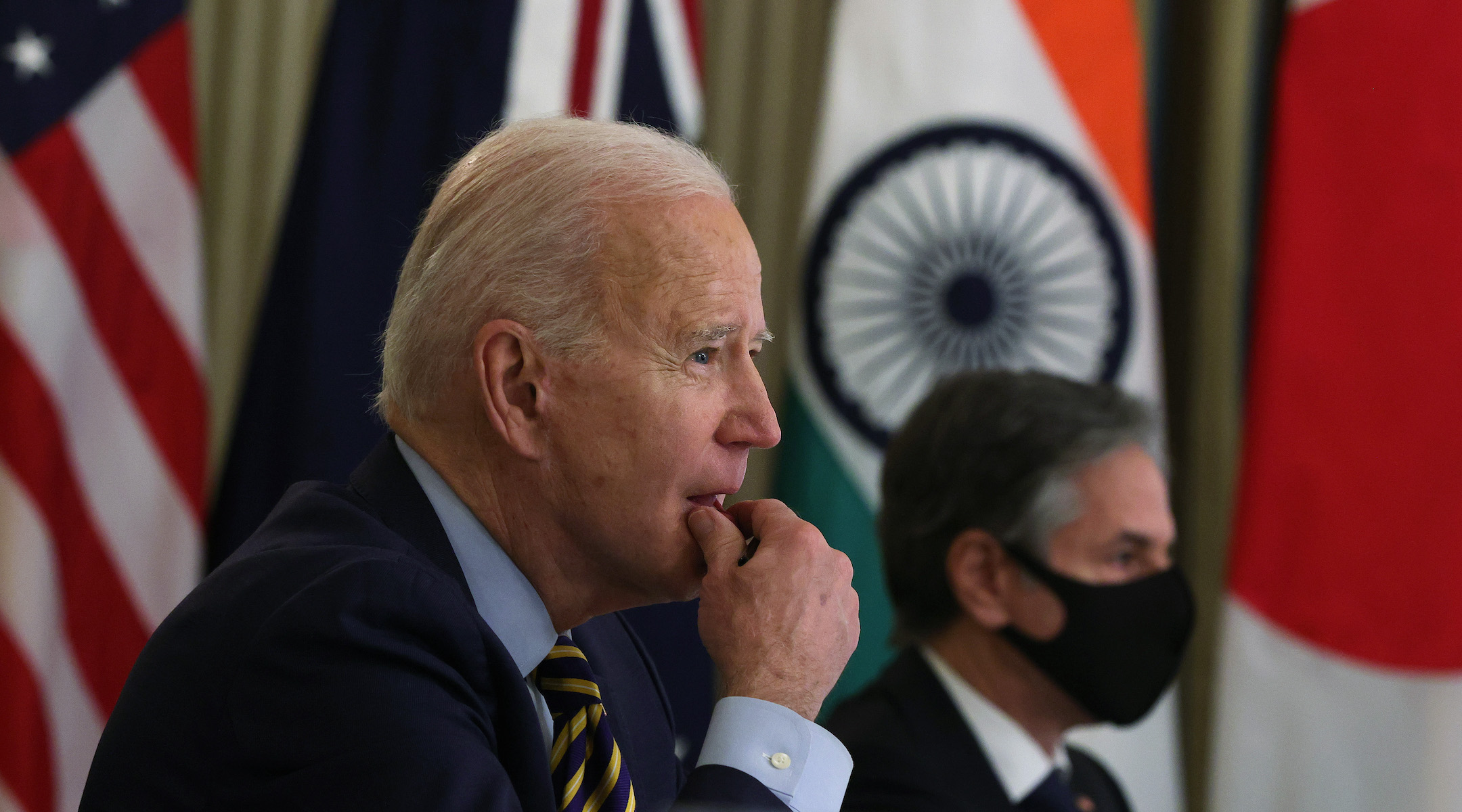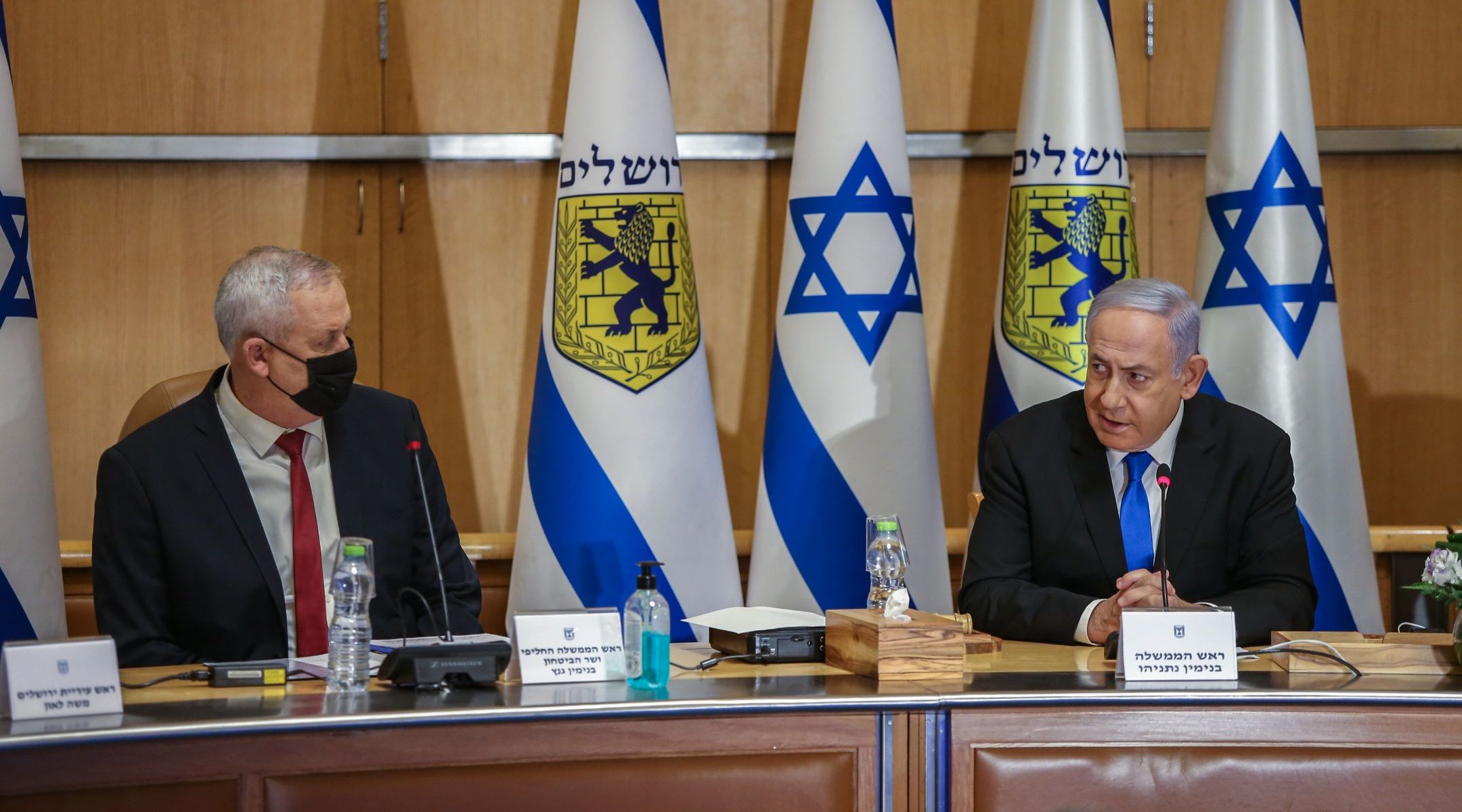(JTA) — In the seven years since the last war in Gaza, Israel and Hamas have repeatedly come close to reigniting the conflict.
But the peace on the Gaza border has largely held — until this week. Since the end of Israel’s last major offensive in the summer of 2014, there has been unrest in Jerusalem and elsewhere, terror attacks across Israel and protests on the Gaza border that turned deadly.
Many of the tensions that have bubbled up in recent weeks between Israelis and Palestinians are not new. They have surfaced time and again in recent years. But whenever Israel and Hamas, the militant group that controls Gaza, seem to be on the verge of starting another war, both have backed down.
That isn’t happening this time. Following weeks of mass protests and unrest in Jerusalem, Hamas has kept Israel under a steady barrage of rocket fire since Monday, bombarding Tel Aviv, the southern city of Ashkelon and the towns on the Gaza border. Israel has responded with withering airstrikes on Gaza. Dozens of Palestinians and three Israelis have been killed. Rather than coming to an end, the violence appears to be spreading.
Why has this clash mushroomed into what looks to be a war? Some of the answers can be found in past conflagrations. But others are unique to this moment — and stem from an unusual convergence of leadership gaps in Israel, the Palestinian Authority and the United States.
Here’s what you need to know about who’s in charge, or not, as the rockets fly.
Israel is in the midst of an extended leadership crisis.
Prime Minister Benjamin Netanyahu likes to tout his right-wing credentials regarding the Palestinians. But Israelis also view him as cautious when it comes to actually fighting wars.
In the 12 years of Netanyahu’s second tenure in office, Israel has fought just two wars in Gaza, in 2012 and 2014. Using diplomacy and limited military engagement, he doused the fires — even receiving praise for his “level-headed leadership” in 2014 from a coalition of left-leaning retired generals.
This time he was late to respond to the outbreak. That’s because he and his political rivals are still negotiating over forming a government following elections in March, Israel’s fourth in two years. For months — and much of those past two years — Netanyahu has been a caretaker prime minister in charge of a transitional government. On Monday, in fact, he appeared to be just days away from losing power to a coalition of his opponents.
Beyond his political woes, Netanyahu is mired in a trial on corruption charges that have dogged him for years.
But exactly what Netanyahu says and does may not matter if other Israeli politicians, including some of his putative allies, behave differently — which they are.
Israel has seen politicians with little actual power spark conflict before. Back in 2000, Ariel Sharon was the leader of the parliamentary opposition when he strolled across the Temple Mount with an entourage, stoking tensions that would lead to the second intifada.
Sharon had no role in government at the time, and then-Prime Minister Ehud Barak, who was trying to forge a peace treaty, made it clear he did not support the action. That didn’t matter to the Palestinian street. A senior Israeli elected official broke a taboo, and did so not inadvertently but as an intentional political statement.
That scenario is playing out again now: Itamar Ben-Gvir, a newly elected Knesset member from a far-right party, has no current role in shaping Israeli government policy. That will be all the more true if Yair Lapid, the centrist leader tasked with setting up a government, succeeds in ousting Netanyahu.
It doesn’t matter. Ben-Gvir still carries the imprimatur of an elected official. When he appears with far-right protesters in the contested eastern Jerusalem neighborhood of Sheikh Jarrah, it conveys the impression to Palestinians that anti-Palestinian violence has government approval.
Also helping that impression is Aryeh King, a deputy mayor of Jerusalem, who was caught on video yelling at a Palestinian activist that he should be shot in the head.
Palestinian leaders are battling for authority amid shifting sands — and increasing frustration.
The Palestinian Authority is gingerly returning to its feet after three years of isolation by the Trump administration. The P.A. proposed and then canceled elections, which would have been its first since the mid-2000s, in part because of the very real possibility that Hamas could win. Hamas, which rejects the idea of any accommodation with Israel, first took control of Gaza as the result of a 2006 election.
The current Palestinian Authority president, 85-year-old Mahmoud Abbas, has been deeply unpopular for years. The Palestinians’ uncertain leadership does not bode well for being able to rein in an uprising.
The Palestinian uprisings, or intifadas, launched in 1988 and 2000, stemmed in great part from frustrations with a Palestinian leadership that appeared adept at posturing but not at accomplishing anything. Following the years of marginalization by President Donald Trump, a pandemic-battered economy and a perception that the Arab world is eager for ties with Israel and couldn’t care less about the Palestinians, young Palestinians are taking things into their own hands.
“Young Palestinians are displaying a fearlessness that we haven’t seen” since the launch of the second intifada in 2000, said Daniel Seidemann, who runs Ir Amim, an organization that reports on how Jerusalem’s disparate communities coexist (or don’t). “I mean, they’re taking the police on face to face.”
The Palestinians in the street, he said, “can’t imagine a trajectory where their lives get better and they become free. They can’t imagine it.”
Yousef Munayyer, a nonresident fellow at the Arab Center here, said the uprising has brought into the open the weak and compromised status of the Palestinian Authority, which he depicted as hidebound by its own corruption and its alliance with Israel.
“All these [protests] are taking place outside of the repressive reach of the Palestinian Authority, which tells us something pretty important — that the leadership of the P.A., which is sitting in Ramallah, either does not want to capitalize on this momentum or is not capable of it because of the situation that they’re in,” said Munayyer, who is Palestinian.

President Joe Biden and Secretary of State Anthony Blinken participate in a virtual meeting with leaders of Quadrilateral Security Dialogue countries in the White House, March 12, 2021. (Alex Wong/Getty Images)
The United States isn’t yet in a position to lead.
The Biden administration, meantime, is preoccupied with rolling back a pandemic and reviving the economy crippled by the pandemic.
The capacities that would usually be in place to stem violence — consultations between the Israeli and Palestinian governments and the United States — have either disappeared or are diminished. Biden has yet to name an ambassador to Israel or reopen a dedicated consulate for the Palestinians in Jerusalem, veteran U.S. negotiator Aaron David Miller noted on Twitter.
“I realize the Administration has lowballed and deprioritized the Middle East and Israeli-Palestinian issue,” he said. “But the lack of an Ambassador to Israel and a consul general in Jerusalem is a serious problem during a crisis.”
Biden did not speak with Netanyahu for weeks after moving into the White House, and though top officials of both countries have been meeting recently, their primary focus has been on Iran.
The Biden administration has shown little appetite for roiling domestic politics by pressuring Israel to halt far-right demonstrations or stop the potential eviction of Palestinians in eastern Jerusalem.
The Trump administration slashed diplomatic engagement with the Palestinians and ended aid. Biden wants to revive both, but it is early in his presidency, and U.S. diplomats in the region do not have the outreach to Palestinians they once did, nor the leverage to effect change even if they could get someone on the phone.
Also a casualty: intelligence sharing between Israel and the Palestinian Authority funded in part by the United States. The P.A. diminished the intelligence sharing drastically after Congress passed laws in 2018 targeting funding for the Palestinians.
Secretary of State Antony Blinken has taken steps to tamp down tensions. But Israeli officials have indicated that they do not want U.S. intervention. Meanwhile, American lawmakers have taken to social media to offer cautionary notes and takeaways that match their beliefs about the Israeli-Palestinian conflict, potentially attenuating any concerted response.
A number of moderate Democrats, including pro-Israel stalwarts like Sen. Chris Coons of Delaware, have robustly criticized Israel with respect to the evictions while upholding its right to defend itself against rocket fire — a departure from pro-Israel orthodoxies unimaginable during the 2014 war.
What happens in Jerusalem does not stay in Jerusalem.
One feature of this latest unrest has been support for the Palestinians among Israeli Arabs, who have held mass demonstrations within Israel’s recognized borders with an intensity not seen since the outbreak of the second intifada two decades ago. In the central Arab-Jewish city of Lod, Arab protesters reportedly burned stores and synagogues in what the city’s mayor called a “civil war.”
The Arab Center’s Munayyer said Israeli Arabs are driven in part by their own frustrations with an unresponsive Israeli establishment. There has been a wave of Israeli-Arab protests recently against the failure of Israeli police to stem violent crime in their towns and villages. Israeli Arabs are losing faith in the system, and in the capacity of their elected representatives to influence it — a feeling exacerbated by a 2018 Israeli law declaring the country to be a Jewish nation-state that Arab citizens bitterly opposed.
Palestinian flags and other symbology has been a feature at some of these protests, Munayyer said, a signal that Israeli Arabs are despairing of the two-state solution as a means of achieving national sovereignty and are gravitating toward unity with West Bank and Gaza Palestinians.
“With the failure of the policing, the mobilization involved people carrying Palestinian flags and chanting about the love of the homeland,” he said. “That is a framework [that] reflects an understanding of their struggle for equality as being part of a national struggle against what Zionism has done to Palestinians. That is new, that it is being communicated this way.”
Ir Amim’s Seidemann said that Jerusalem historically has been the detonator in Israeli-Palestinian conflicts. The explosions, however, often take place elsewhere.
As if to prove his point, while he was talking, Seidemann was listening to explosions in the nearby Judean hills caused by rockets that Hamas launched from the Gaza Strip and rocket sirens. Meanwhile, life went on in Jerusalem. He said it was all part of living in a new normal.
“We hear the sirens, we hear the rockets and we drink wine,” he said.
JTA has documented Jewish history in real-time for over a century. Keep our journalism strong by joining us in supporting independent, award-winning reporting.






